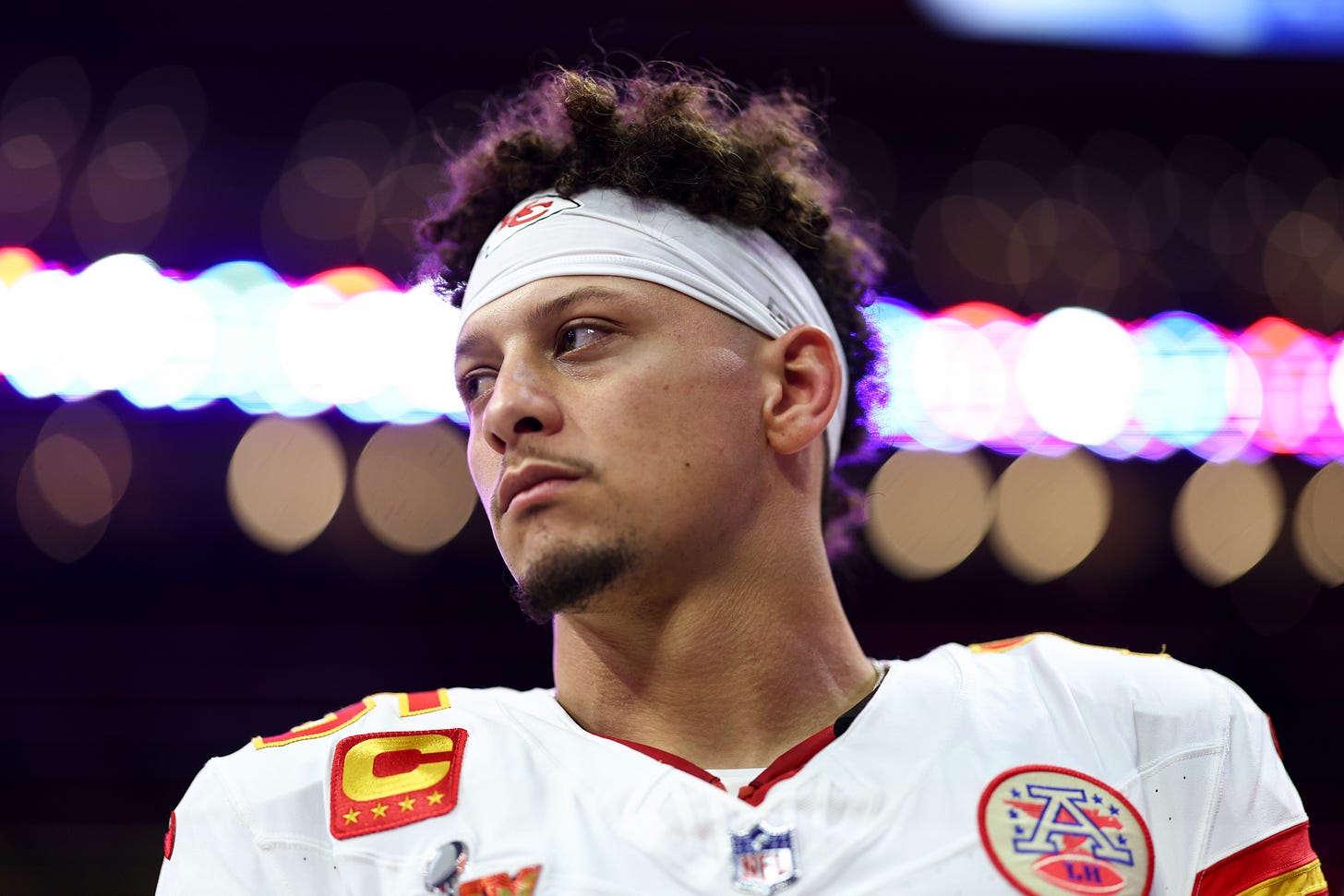REQUIEM FOR AN EPIC QUEST: Making Sense of the 2024 Kansas City Chiefs Season...
... and why it’s still (nearly) Impossible to three-peat in the NFL. Famed author Michael MacCambridge returns to Go Long to put this dynasty in perfect perspective, while also wondering: What now?
Note: The exceptional author Michael MacCambridge — who wrote “America's Game: The Epic Story of How Pro Football Captured a Nation,” “Chuck Noll: His Life's Work” and “The Big Time: How the 1970s Transformed Sports in America” returns to Go Long.
You may recall, he brought his talents to these pages ahead of the 2024 season with “INTO THIN AIR, Part I: Why It’s (Nearly) Impossible to Win Three Straight Super Bowls.”
Below, MacCambridge puts the Kansas City Chiefs’ three-peat quest into exceptional perspective.
How did the Chiefs get to a third straight Super Bowl? How impressive is this run in NFL history? What should we think about Patrick Mahomes and the “all-time great” debate. And what’s next?
Nobody is more qualified to answer these questions than MacCambridge.
Go Long paid subscribers can access the piece its entirety.
By Michael MacCambridge
I. HOPE
At some level, sports fandom — over the course of a season or even a game — is about extending hope. Win a playoff game, you’ve bought yourself another week of hope. Win a conference championship game, you’ve earned two more weeks of hope.
For the Kansas City Chiefs and their kingdom of fans, hope has been a constant over the past three years. So last Sunday, there was still hope brimming despite trailing early 10-0; that deficit had become routine for Super Bowls in the Patrick Mahomes era. The hope flickered, but remained even after the Cooper DeJean pick-six made it 17-0, Eagles. And against all logic, there was still hope after the second interception, and the scoreboard reading 24-0 late in the second quarter.
Some of these Chiefs had experience overturning a 24-0 postseason deficit. In the divisional round of the 2019 playoffs, they trailed the Houston Texans by that same score. On that occasion, Mecole Hardman re-energized the crowd with a long kickoff return that led to the first touchdown, Daniel Sorensen snuffed out a brazen fake-punt attempt to set up the second, then forced a fumble on the ensuing kickoff that brought on a third. The avalanche began, the Chiefs had taken the lead by halftime and won, 51-31, on the way to their first Super Bowl in 50 years.
So in Super Bowl LIX on Sunday, with a minute and change left in the first half, hope had not been extinguished. There was still time to score and the Chiefs knew they’d get the ball to start the second half. Then Patrick Mahomes rolled to his right and saw something he’d rarely seen all day — a primary receiver who was uncovered. There was future Hall of Famer DeAndre Hopkins, astonishingly wide open on a deep crosser. Mahomes fired an accurate pass, and Nuk — who possesses as sure a pair of hands as anyone in the league — inexplicably dropped it.
Hope went on life support at that moment and was dead by early in the third quarter. It was going to be one of those days. The Kansas City Chiefs’ epic quest for an unprecedented three-peat of Super Bowl victories was going to be vanquished at the last juncture and in the most emphatic manner imaginable. Yet even in the midst of a 40-22 clobbering that wasn’t nearly that close, the Chiefs had achieved something that’s never been done — getting back to a Super Bowl after winning the two previous. They also became the first team to make five Super Bowls in a six-year span. Those accomplishments, achieved in an injury-plagued, exhaustively arrhythmic season, was proof of their remarkable will and resilience.
But the elusive three-peat — far rarer in the NFL than any other major American sports league — proved a bridge too far even for one of the signature dynasties in the sport.
I wrote back in August about why it was (nearly) impossible to win three consecutive Super Bowls. The 2024 season was a case study in proof of concept. It was a grueling and at times heroic effort that concluded with the jarring, disorienting loss. It left two questions: How did the Chiefs, despite a crucial spate of injuries and a dire crisis on the offensive line, still manage to get to the doorstep of the elusive three-peat and somehow enter their third straight Super Bowl having won a remarkable 23 out of their last 24 meaningful games? And then, once they reached New Orleans and faced their chance at history, how did they get battered so decisively, and how much does one terrible game at the end of this long journey affect the Chiefs’ place in history?
II. THE DELUGE
It is true in this football season, as with any other, that most of what we read, see and hear in the immediate aftermath of the season’s final game is an overreaction.



